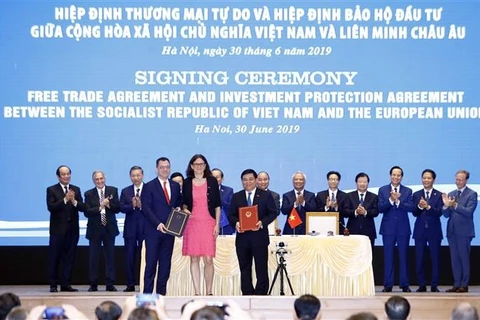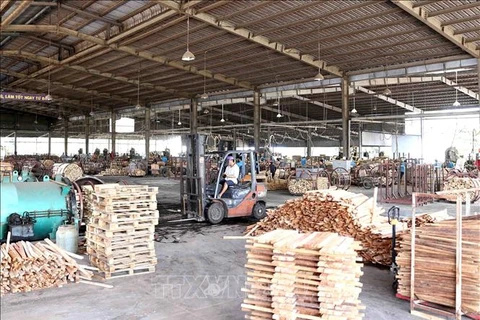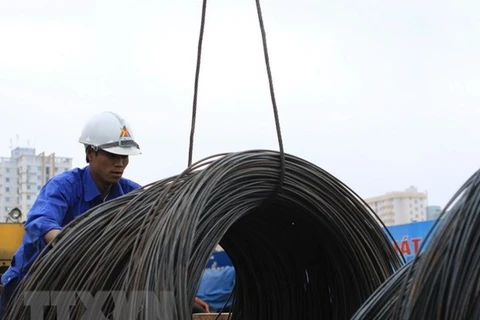 A view of a terminal of the Saigon Newport Corporation. Logistics firms are expected to benefit from the inflow of foreign capital, as the amount of shipments handled at ports is expected to increase thanks to the EVFTA (Photo: VNA)
A view of a terminal of the Saigon Newport Corporation. Logistics firms are expected to benefit from the inflow of foreign capital, as the amount of shipments handled at ports is expected to increase thanks to the EVFTA (Photo: VNA) Hanoi (VNS/VNA) - Vietnam’s benchmark VN-Index has risen since the ratification of the EU-Vietnam trade agreement on the back of listed firms whose exports would be boosted by the deal.
However, securities firms have warned their increased share prices may not be sustained as those companies face some internal challenges in meeting the EU’s requirements.
Logistics and industrial property are two economic sectors that would benefit from the transfer of capital from the EU to Vietnam as the free trade agreement has opened the door for more foreign investors.
Viet Dragon Securities Co (VDSC) says Vietnam may become a new manufacturing hub as US-China trade tensions could shift global manufacturers to Vietnam from China.
With the signing of the EVFTA, shipments to Vietnam will increase as foreign companies will have to import machines and equipment to establish their plants in the country.
However, VDSC warns Vietnam is becoming highly dependent on foreign direct investment (FDI). Therefore, if FDI firms underperform, the logistics sector will also dive.
In addition, a large number of logistics companies haven’t maximised their potential and improved their competitiveness, so they won’t be able to make the best use of the advantages brought by the EVFTA.
Analysts have said textile and garment companies are going to take advantage of the trade deals between Vietnam and the European Union as EU tariffs on these products will be curbed to zero per cent by 2026.
But if Vietnamese producers want tax cuts for their exports, they have to meet the EU’s strict requirements on the origin of input materials, according to a report by Bao Viet Securities Co (BVSC) released in June, 2019.
For textile and garment products, input materials must be locally made in Vietnam, the EU and markets with free-trade agreements with the two sides – like the Republic of Korea – and the production must be done in Vietnam or the EU.
Few Vietnamese textile and garment firms meet those requirements as local companies are only capable of production, while input materials must be imported from China and Taiwan – which are not bound by any trade deals with the EU, BVSC reports.
Concerns about the lack of producing raw materials among textile and garment companies caused their shares to underperform or record modest gains on July 8.
Of the 20 textile and garment companies listed on both the Ho Chi Minh and Hanoi stock exchanges, only Duc Quan Investment and Development JSC (HoSE: FTM) gained 0.8 percent on July 8.
The rest of the companies’ stocks either slid or closed flat at the end of the first day of the week. Shares of Everpia JSC (HoSE: EVE) fell 0.7 percent and Thanh Cong Textile Garment Investment Trading JSC (HoSE: TCM) lost 2 percent.
Since June 30, Everpia shares have slid 1.1 percent while Thanh Cong shares have gained only 2.2 percent. - VNS/VNA
VNA
























